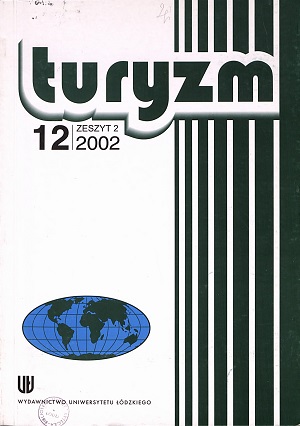Tourism: A Fuzzy Concept?
DOI:
https://doi.org/10.18778/0867-5856.12.2.05Keywords:
tourism, tourism definitions, fuzzy concept, humanistic approach to tourism, tourism geographyAbstract
The author has observed that books and publications about tourism usually need to begin by defining the concept, and that each definition given is slightly different from the next. From this observation, the author assumes that although tourism is a fuzzy concept a definition is nevertheless necessary. The WTO definition actually seems the ‘least appropriate’, but can - even must - be adapted according to research circumstances. Recognizing the fuzzy nature of tourism seems firstly to correspond to a general trend in academic research, secondly to satisfy the need for professionals and scholars to have only a single common definition, thirdly to allow the inclusion of new practices and products which mix business and pleasure, and fourthly to allow consideration of the human dimension of tourism, which in turn implies a more humanistic approach.
Downloads
References
Aron C., 1999. Working at play. A history of vacations in the United States, Oxford University Press.
Google Scholar
Benthien B., 1997, Geographie der Erholung und des Tourismus, ed. Klett-Perthes, Gotha.
Google Scholar
Brunet R., Ferras R., Thery H., 1993, Les mots de la géographie. Dictionnaire cräique. Reclus - La Documentation Française, Paris.
Google Scholar
Buttimer A., 1993, Geography and the human spirit, The Johns Hopkins University Press, Baltimore-London.
Google Scholar
Canastrelli E., Costa P., 1991, Tourist carrying capacity. A fuzzy approach, “Annals of Tourism Research", no 2, p. 295-311.
Google Scholar
Dewailly J. M., Flament E., 2002, Tourisme, géographie et «flou», L’Espace géographique (in print).
Google Scholar
Duhamel P., Sacareau I., 1998, Le tourisme dans le monde, ed. Armand Colin, Coll. Prépas Géographie, Paris.
Google Scholar
Holz J. M., Houssel J. P., 2002, L'industrie dans la nouvelle économie mondiale. Presses Universitaires de France, Paris.
Google Scholar
Knafou R., Bruston M., Deprest F., Duhamel P., Gay J. C., Sacareau I., 1997, Une approche géographique du tourisme, “L'Espace Géographique", no 3, p. 193-204.
Google Scholar
Knafou R., Violier P. (coord.), 2000, Tourismes en France: vivre de la diversité, "Historiens et Géographes", no 370. p. 367-384.
Google Scholar
Memento du tourisme, 2001, Secretariat d’Etat au Tourisme, Paris.
Google Scholar
Middleton V. T. C., 1980, Trends and prospects in tourism, [in:] Countryside Recreation Research Advisory Group Conference, Lancaster, p. 40-44.
Google Scholar
Recommandations sur les statistiques du tourisme, 1994, O.M.T. (Organisation Mondiale du Tourisme), Nations-Unies, New York.
Google Scholar
Rolland-May C., 1984, Les espaces géographiques flous, Thèse d'Etat, Université de Metz.
Google Scholar
Thom R., 1975, La science malgré tout, [in:] Encyclopedia Universalis. Organum, Paris.
Google Scholar
"Tourism Management", 1999, no 1, no spécial «Research methods and conceptualisation».
Google Scholar
Downloads
Published
How to Cite
Issue
Section
License

This work is licensed under a Creative Commons Attribution-NonCommercial-NoDerivatives 4.0 International License.










